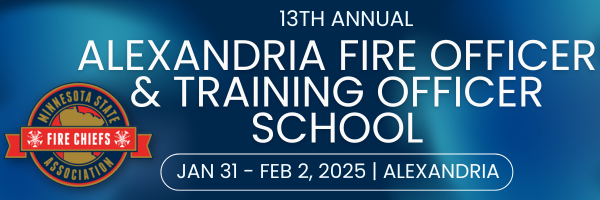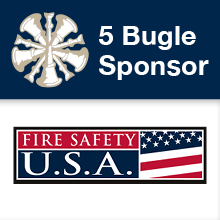|
2025 Alexandria Fire Officer & Training Officer School
10 Minutes and Beyond The overall goal of the course “10 Minutes and Beyond” is to build on the training obtained in the previous MSFCA Fire Officers School class: “The First 5 Minutes”. The purpose of this training will emphasize the behaviors necessary to ensure safe incident ground operations through lecture, demonstrations, individual, and group activities.
The course will be scenario driven and will attempt to focus on fire-ground operations, crash incidents, search incidents, and natural disasters. Accountability in Leadership As a leader in today's environment, we are met with many challenges in dealing with programs, people, and politics. Leadership tactics have evolved from the traditional approaches from which we will need to evolve. Within this course, you will dive into the challenges you are facing today. Discussions and exercises will help you talk through some of the complex issues facing today’s leaders in Public Safety. Finally, utilizing real-world examples, you will identify key strategies to help you lead your organization. Critical Thinking for Fire Ground Operations Each and everyday Emergency Services respond to numerous calls that require different approaches to best control the situation. Often, the decisions of controlling that situation happen within seconds. Some of these situations end up going longer than the “normal” call. This critical thinking session is designed to provide you a background and enhance your decision making on a scene both initially and long term incidents. Learn from case studies and lessons learned on the ICS City a 5 ft. x 32 ft. training city that you will be utilizing during the session. The session scenarios will start at a baseline level and grow in intensity and complexity. The ICS City allows for students to utilize the concepts learned during class and their “real world” experience and apply to the exercise that is unfolding in front of them “in the city”. The session will have training components and many “hands on” opportunities with the ICS City.
Fire Ground Management - First Arriving Officer Participants will learn the importance of conducting a thorough size-up before committing limited resources. This course will develop company officers’ incident scene supervisory and management capabilities in structural fire operations. Key content includes discussion and scenario-based practice on controlling and implementing the activities that need to be done to successfully deal with personnel performing the following operations; rescue and ventilation, confinement and extinguishment, water supply, exposures, offensive and defensive operations, salvage, overhaul and support. This course takes a practical, common sense approach to fighting fires in single-family homes, multi-family apartment buildings, light industrial and commercial structures. It takes into account the realities of today's fire service–that is, most fire departments in this country are, understaffed, less experienced and involved in more EMS than ever before. If your incidents seem to run themselves and you’re not in control, then this course is for you.
Inspire the Leader Within Leadership effectiveness is the ability to influence others through a balance of leading, managing and coaching. Officers who share vision, coordinate efforts, and empower others bring people together and discover solutions that draw upon the talents of all the firefighters. Great leaders embrace new approaches and communicate in ways that engage others. The most effective officers understand the importance of leading authentically and are dedicated to developing themselves. It is a commitment to create a culture of excellence that results in each officer inspired to contribute their very best toward a common goal. Learning Objectives
|







